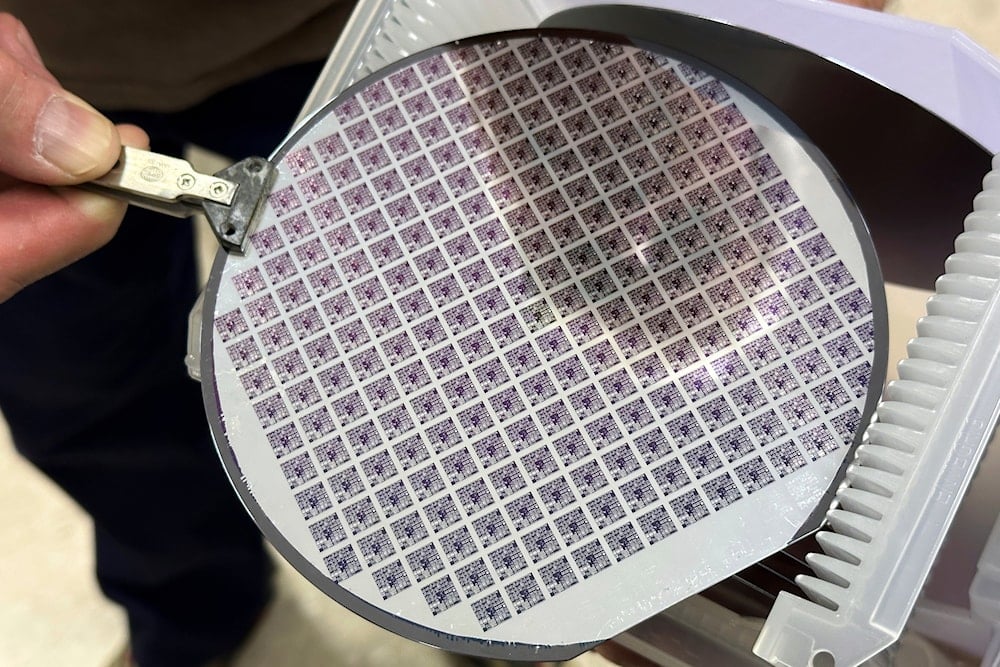South Korea plans $4.9bln chip support amid US tariff concerns
South Korea is looking towards bolstering its $129.2 billion semiconductor industry in a move to safeguard against Trump's tariffs, which have put foes and allies in the dark regarding the future.
 A semiconductor silicon wafer fabricated with several microchip microprocessors is pictured at the school of microelectronic engineering at the Rochester Institute of Technology in Henrietta, New York, on Monday, April 14, 2025. (AP)
A semiconductor silicon wafer fabricated with several microchip microprocessors is pictured at the school of microelectronic engineering at the Rochester Institute of Technology in Henrietta, New York, on Monday, April 14, 2025. (AP)
South Korea on Tuesday unveiled plans to inject nearly $5 billion more into its semiconductor industry, citing growing uncertainty over US tariffs amid Trump's sweeping levy bombardment.
As a major exporter to the United States, South Korea faces the risk of significant damage to its powerhouse chip and auto industries from President Donald Trump's threatened 25% tariffs, raising concerns that have weighed heavily on Seoul-listed shares of Samsung, the world's largest memory chip maker, and SK Hynix, the top supplier of memory chips.
In response, officials have moved to offer greater support for the economically vital industry by revealing plans to inject an additional $4.9 billion into it through 2026, "An aggressive fiscal investment plan has been devised to help local firms navigate mounting challenges in the global semiconductor race," the Finance Ministry announced.
The Finance Ministry warned that "growing uncertainty" stemming from repeated US tariff threats had pushed the sector to seek increased support urgently.
"To foster a dynamic, private sector-led ecosystem for semiconductor innovation and growth, the government will increase its investment in the sector from 26 trillion won ($18.2 billion) to 33 trillion won," the ministry stated.
Trump announced sweeping tariffs on April 2, dubbed "Liberation Day," targeting global trading partners with a 25% levy on South Korean goods, before later backtracking and delaying their implementation for 90 days.
"Duties targeting specific sectors such as semiconductors and pharmaceuticals, remain on the horizon", Finance Minister Choi Sang-mok said during a meeting, adding that "The government plans to expand support for the semiconductor industry, allocating 33 trillion won, with over 4 trillion won in fiscal spending set to be injected through 2026."
The package includes funding aimed at infrastructure development, such as underground transmission lines at semiconductor clusters that are still under construction.
Choi emphasized the government's strong commitment to backing semiconductor company investments, noting that the package also focuses on developing industry talent as part of a broader revised supplementary budget proposal totaling 12 trillion won ($8.4 billion) that still awaits approval from the National Assembly.
South Korea, US, to discuss tariffs next week
The United States recorded a $66 billion trade deficit with South Korea last year.
Seoul last week introduced a $2 billion emergency support package aimed at helping carmakers navigate ongoing challenges, with officials reporting that South Korea's auto-related exports to the United States reached $42.9 billion last year, though analysts noted that, for the time being, the country may not need to be overly concerned about the state of its semiconductor chips sector.
"Unlike automobiles, which are already subject to tariffs, semiconductors are unique in that the United States lacks viable substitutes," Kim Dae-jong, a professor at Sejong University, explained to AFP "Our companies are building large-scale semiconductor plants in the US, contributing to local job creation, a point that will likely be emphasised," Kim added.
He emphasized that "Behind-the-scenes negotiations will likely continue, and there is a chance they could conclude on a positive note. There also remains the possibility that tariffs will be adjusted item by item in the future."
Last week, Trump spoke with South Korean Prime Minister Han Duck-soo, who is currently acting president following the removal of Yoon Suk-Yeol from office, while on Monday, US Treasury Secretary Scott Bessent announced that trade talks with South Korea would be held the following week.

 4 Min Read
4 Min Read








